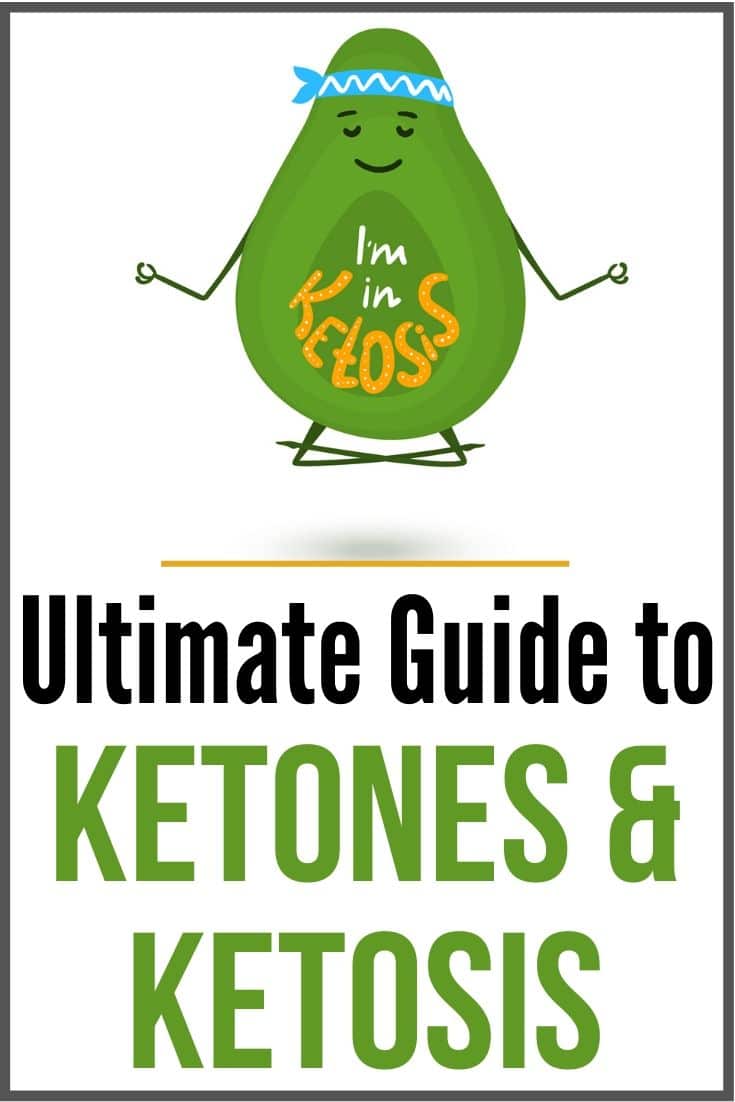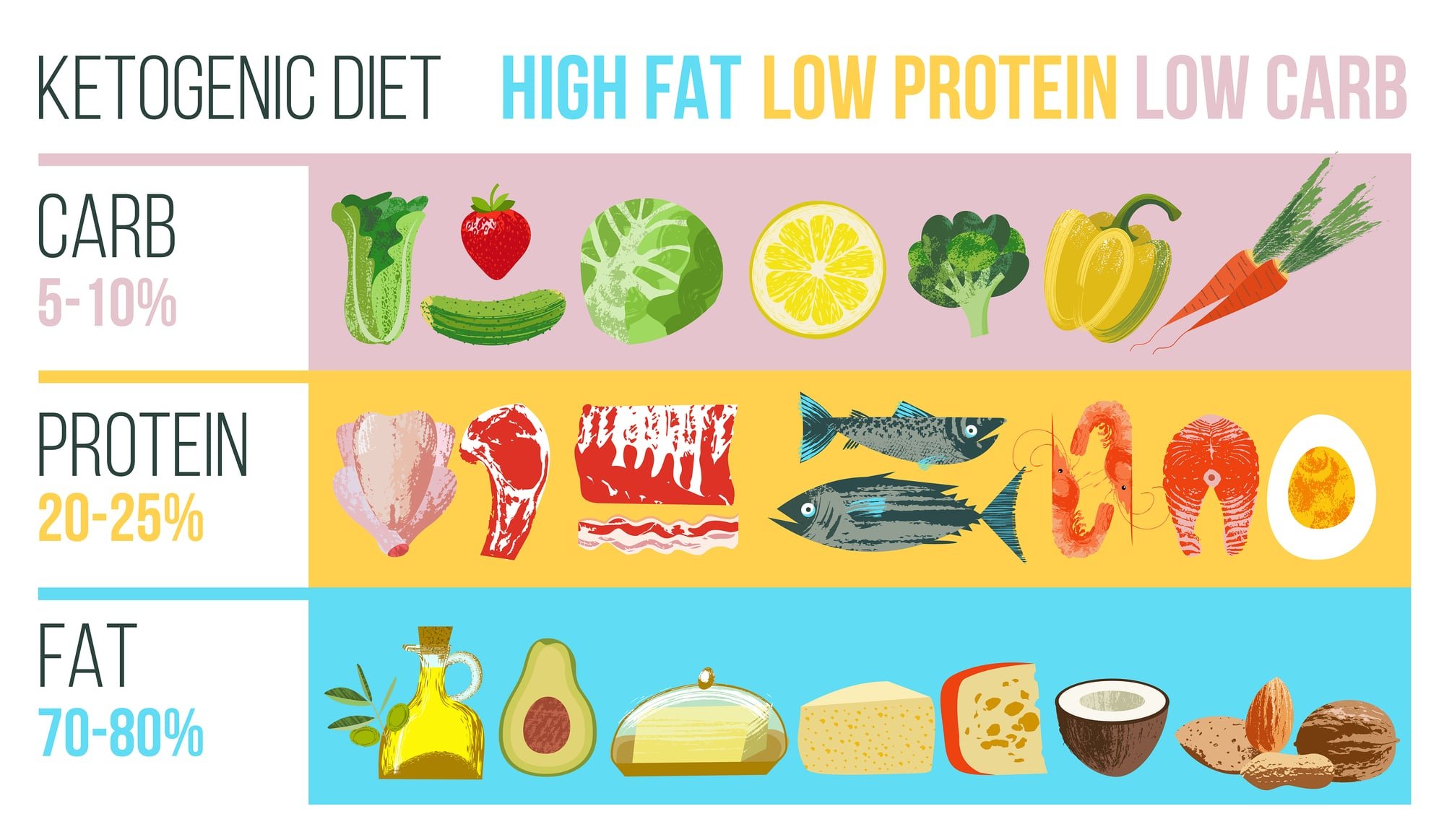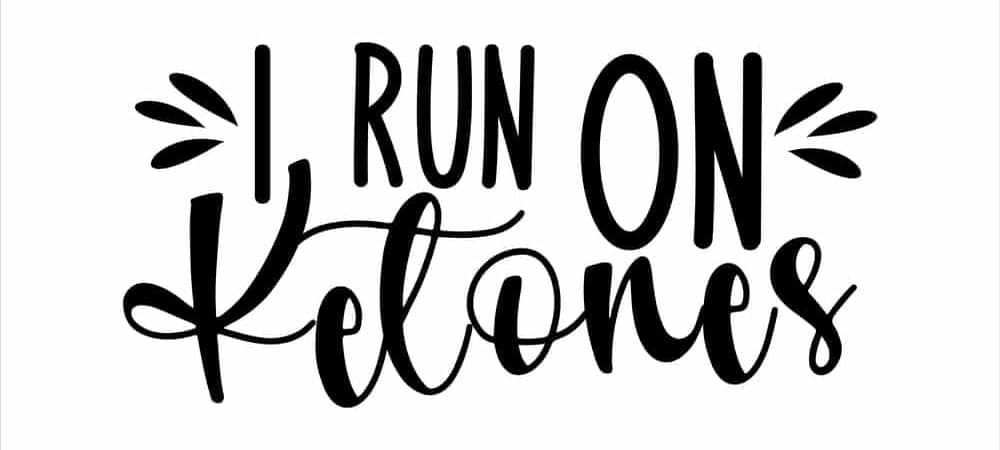What is Ketosis: Ultimate Guide to Ketosis & Ketones
What is Ketosis? Learn about the benefits for your body and how to know if you’re in ketosis!

Want to save this recipe?
What Is Ketosis? Ultimate Guide to Ketosis & Ketones
Since the Keto Diet has become increasingly popular, so has the term Ketosis – but what does it mean exactly? Is it good or bad to be in Ketosis? What are the benefits of Ketosis?
This guide will teach you both the symptoms and benefits of Ketosis – as well as information to help you know if it’s right for you! I also hope to answer some of your questions about the good and bad side effects and symptoms like mental focus, energy, bad breath, urine smell, and the dreaded “keto flu.” Let’s dig in!
Don’t miss my comprehensive How to Get Started with the Keto Diet ebook, where all the resources to get started are compiled in a simple downloadable format without needing to read multiple blog posts.
How Does the Ketogenic Diet Work?
The way to get into Ketosis is by following a Ketogenic diet, so let’s start there. According to dictionary.com, the definition of ketosis is, “A metabolic state characterized by raised levels of ketone bodies in the body tissues, as a consequence of a diet that is very low in carbohydrates.”
In a nutshell – the ketogenic diet works by switching your body’s fuel source from glucose from carbs to fatty acids. We do this by eating only low carb/no carb foods. The goal is to get into a state of Ketosis so that all the glorious fat-burning can begin!
For more information on how to begin the Keto Diet – check out my Guide to Getting Started on Keto.
What is Ketosis?
Ketosis is the medical term for the metabolic state where your body begins to burn fat for energy rather than carbs.
A high-carb diet will give your body lots of glucose to turn into energy. But if you deprive your body of carbs? It will resort to breaking down existing fat stores to get access to fatty acids. (Hooray – right?!)
Your body will then use these fatty acids to make fuel by sending them to the liver. The liver turns them into ketones, which are an efficient fuel for both body and brain. You’re considered to be “in ketosis” if your body is producing a high enough level of ketones.
How to Determine If I Am In Ketosis Or Not?
It’s hard to know when you’ve begun the Keto diet, whether or not you’re doing it right. How do you know for sure if you’re in Ketosis? The scale may jump up and down from day to day, and energy may ebb and flow – but the ketones will tell the truth.
Aside from the symptoms of ketosis I mentioned earlier – one surefire way to know if you’re in Ketosis or not is to measure for them! Your liver is producing ketones at an accelerated rate when you’re in Ketosis, and therefore, it will show in your blood, breath, and urine. The level at which you’re officially considered to be in light Ketosis is between 0.5-1.5 mmol/L. An optimal ketone level (which is recommended for weight loss) is around 1.5 – 3 mmol/L. To accurately test levels of ketosis, a blood meter is needed to determine your levels. Source: Diet Doctor
**If you have type 1 diabetes, please consult your doctor before beginning a keto diet. Nutritional ketosis and diabetic ketoacidosis are different. It is important that you understand the difference as diabetic ketoacidosis is very dangerous to a person with type 1 diabetes. I am not a doctor, and therefore a physician should be consulted.
Signs & Symptoms You’re In Ketosis
While everyone is different – there are some common ketosis symptoms to look for:
Obvious Weight Loss.
Many people love the fact that the Keto Diet may give them results quickly – which is the motivation needed to continue forward. While different people will lose weight differently – this could be one of the first signs to tell you you’re in Ketosis.
Feeling Less Hungry
As your body moves to burning ketones, you may start feeling hungry less often. Using fat as fuel has the added benefit of making you feel FULL for a long time.
Dry Mouth or Keto Breath
I noticed dry mouth very quickly, as did some of my friends – and you may notice it as well! You may also have a sweet taste in your mouth and/or become more thirsty. Read more about it below and drink lots of water!
Ketone Production High
There’s a way to measure the level of ketosis you’re in by testing ketone production. You can test via a ketone blood monitor to know for sure. Urine strips do not test actual levels and aren’t always accurate.
Increase Focus and Energy
This is one of the best symptoms! It is noticeable and such a great feeling!
Bathroom Troubles
It will take your body a little while to get into the new routine – and that includes your digestive system. Throw in lots more cheese in your diet? It’s a good idea to add Magnesium Citrate and Potassium supplements to your diet at the start to help keep you regular. At the same time, others notice diarrhea because their bodies aren’t used to processing the added fats. This will generally work itself out.
Change in Urine Smell
Your urine can have a sweeter/stronger odor.
About Keto Breath
Ketosis Breath – aka Keto breath – is very common for those on the Ketogenic Diet and is a direct result of increased levels of Ketones in the blood. The ketones your body creates during the breakdown of fatty acids are expelled through urine and breath. It may smell unpleasantly sweet and faintly like a nail polish remover, some people say it smells fruity. Either way, it’s most noticeable at the beginning of your keto journey, when the body is new to the switch to ketones. One way to help lessen this side-effect is to drink lots of water. This will result in expelling more of the ketones via urine.
Check out my post about the Signs of Ketosis On Your Keto Journey.
Is It Safe To Be In Ketosis?
While nutritional ketosis is beneficial to many people, some should be monitored. Pregnant or breastfeeding women, Type 1 and Type 2 Diabetes, or those with liver, kidney, or heart disease should be monitored by a doctor while on the Keto Diet. Always discuss any major diet change with your doctor first.
Disclaimer: The info in this post is in no way considered medical advice. Please consult a physician before beginning any kind of diet, especially if you already have health challenges.
How Long Does It Take To Get Into Ketosis?
This is the ultimate question everyone wants to know! The time it takes to enter ketosis differs for everyone. It depends on a variety of factors. Whether you already have started the keto diet or are a newbie. It also depends on how many carbs you’re taking in. If you’re eating more than 50 grams of net carbs, it usually takes longer. Most people stick with 20-25 grams of net carbs. For some people, it can take a few weeks for your body to achieve ketosis. For others, you can get into Ketosis in as little as 24-hours.
Ultimately it depends on your approach and the diligence with which you are restricting your carb intake. It varies from person to person based on your unique metabolism and insulin resistance.
The typical keto dieter will reach ketosis in 2-3 days.
What is the fastest way to enter ketosis?
Although everyone’s bodies are different, you can do certain things to help speed up how fast you reach ketosis.
Tips For Entering Ketosis FAST:
- Minimize your carbs. (Less than 20-25 grams of net carbs is a common goal) This is important!
- East GOOD carbs. There is a huge difference between eating natural carbs vs. processed carbs.
- Eat more GOOD fats like avocados, coconut oil, olives, etc.
- Do intermittent fasting.
- Eat more protein.
- Purchase a ketone test kit. You can use urine, aka pee strips, or blood strips. Urine strips aren’t as accurate and do not test actual levels.
- Increase physical activity. This will encourage your body to make more ketones for energy.
- Proper Proportions – Keep your healthy fat intake at 70%, Protein at 25%, and Carbs at 5% to set yourself up for success.
- MCT Oil – Sometimes, MCT Oil can help produce more ketones, and it is an added source of energy. You can find out more here if you’d like to order use code KASEYTRENUM for 15% off.
- Say No To Artificial Sweeteners – You don’t know how your body will handle them, so it may help to stay away from sugar substitutes in the beginning until you know for sure. Many keto-friendly do not raise glucose levels for most, but if you are already insulin resistant, it may be best to avoid at first.
How long does it take to get back into ketosis after a cheat day?
So let’s say you’ve gone off plan to have a special dinner or a favorite dessert that’s going to refill your body’s supply of glucose. What now?
Typically, it takes 24 hours to a week or even longer to get back into Ketosis. It all depends on how long you binged on carbs and how much you ate. It also depends on how long you’ve been in ketosis before cheating and if your body is fat adapted. In short, there is no exact answer. This post has some tips on how to get back on track after a cheat day (or a day off plan as I call them.)
Foods to avoid if you don’t want to deal with the possible setbacks of a cheat day are any starchy or high-sugar items. Starchy Carbohydrates come from foods like pasta, bread, chips, potatoes. Sugary carbohydrates come from high-sugar foods like candy and cookies, sodas, etc… There are a LOT of foods in a typical diet that are high in sugar that you might not even consider! (Regular ketchup, for example.) To see a list of Keto-friendly foods that are low in carbs – check out my printable keto diet foods shopping list to keep handy.
Can Drinking Too Much Water Kick You Out of Ketosis?
Nope! Drinking lots of water is SO IMPORTANT when you’re on the Keto Diet. Carbohydrates are responsible for storing water in the body, so when you drastically reduce those, you need to replenish that water more often now. No matter how much water you drink, the amount of ketones your body produces stays the same. However, if you’re testing for ketones using the urine strips I mentioned above – you will have “watered down” the test results. Your ketone measurement will show up as a lower amount in the urine. On that same note, a very dark urine ketone reader may indicate dehydration.
How Long Is It Safe To Be In Ketosis?
There are a lot of people who have made the keto diet part of their lifestyle. This means people can stay in ketosis for as long as they want. To ensure you’re “safely” in ketosis, you should get bloodwork done at least once a year so your doctor can see the results of your diet and let you know if you should be making any changes.
What are the benefits of Ketosis?
Here’s how being in Ketosis may benefit you…
Short Term Benefits:
- Fat Loss (What a wonderful benefit!)
- Appetite Control
- More Energy – Although some folks don’t experience more energy kicks until they become fat adapted.
- Mental Focus
- Reduced craving for Sweets
Long Term Benefits:
Studies have shown that long term ketosis may result in the following health benefits, but there is no guarantee:
- better gut health & digestion
- lowered blood cholesterol
- lower blood sugar levels
- reversal of Diabetes
- reduced triglyceride levels
- lowered risk of heart disease
- seizure management (in fact, this was one of the reasons the keto diet was created!)
- improvement in high blood pressure
- improved immunity = help fighting cancer
- better hormone regulation
This info above is not medical advice, and there is no guarantee of the stated possible health benefits. Please read the linked study for more information.
Can Ketosis Lead to Ketoacidosis?
Nutritional Ketosis vs. Diabetic Ketoacidosis. They are not the same thing. Diabetic Ketoacidosis (DKA) is a concern for people with Type 1 Diabetes as they can enter a dangerous state of Ketoacidocis if they experience high blood sugars over a period of time. This occurs if the body stores up too many ketones and causes the blood to become too acidic. This is dangerous as it can damage the liver, kidneys, and brain and possibly become fatal. It is not the same as nutritional ketosis. Type 1 diabetics should consult a physician before beginning a keto diet.
Best Ways to Measure For Ketones:
Most people ask, “What Does Ketosis Feel Like?”. In the beginning, it might be hard to tell! The best ways to measure ketosis are listed below with links.
Urine Testing Strips – Ketone test strips are not as accurate as the next two, but great for giving you a rough idea if you’re in Ketosis or not. Ketosis strips are also CHEAP, which is a great reason to start with these when you’re beginning a Keto Diet! Keep in mind, they don’t accurately measure actual levels of ketones, and the longer you eat keto, the less accurate they become. I consider their measurement more like a pregnancy test as an indicator of whether I am in ketosis or not.
Breathalyzer – This method of testing is better than the urine strips but still not quite as accurate as a blood monitor listed below. The breathalyzer measures ketones on the breath throughout the day – for folks who want to ensure they haven’t been knocked out of ketosis by a certain food.
Blood Monitor – Blood tests are the most effective way to measure for Ketones. These are specifically designed to test for ketones in the blood and give an exact measurement.
What’s The Best TIME To Measure Ketones?
The most important time of day to test is one which will be easy for you to maintain. It’s good to be consistent, so you get a more accurate reading.
Testing in the morning before eating/drinking, or in the evening a few hours after eating/drinking will give the best results. Additionally, this study shows that ketone strips give the most accurate readings in the early morning or evening.
What is Ketosis: Conclusion
In conclusion, ketosis is a state that we all can reach as long as we stay diligent and committed. Reaching it may help you achieve your weight goals or other health goals, which is the ultimate satisfaction! Please be aware that I am not a doctor, so to avoid any nutritional deficiencies, I highly suggest you consult a registered dietitian or nutritionist and physician before starting any diet or lifestyle change.
More Keto 101 Resources:
- What’s the difference between Keto and Low-Carb?
- Intermittent fasting for beginners
- What is Ketosis and what are the signs you’re in it?
- What does it mean to be fat-adapted?
- Leg Cramps on Keto: Causes and Solutions
- The Best Keto Products on Amazon
- 10 reasons that may be causing a stall on the Keto Diet
- Electrolytes on Keto: Explained & Simplified
- 7 Changes You’ll Experience Within the First Month of the Keto Diet
- Amazon Keto List
- 10 easy tips for eating Keto on a budget
- Very Best Basic Keto/Low Carb Grocery List
- How to Make Keto Weight Loss Work When You are Busy!
- Keto Diet for Dummies: Best Keto Resources









